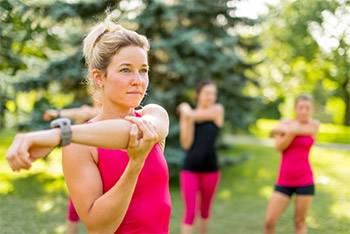International Women's Day

Encourage women to overcome exercise barriers this International Women's Day
Considering International Women's Day this Thursday, 8th March, Exercise & Sports Science Australia (ESSA) is encouraging all women to put themselves first and recognise the significant benefits that physical activity can have on their overall health and well-being.
In 2014-15, 35% of females aged 15 and over were sedentary, accounting for over three million female Australians.
'Per the Australian Health Survey, females of all ages have lower physical activity levels than males. We know that physical activity plays a vital role in positively managing life's physical, mental and social challenges, and we must address any perceived barriers to be able to influence women to overcome them," said Anita Hobson-Powell, ESSA Chief Executive Officer.
The International Women's Day campaign aims to make a positive difference for women and ESSA is taking this day to remind women of the positive effects exercise can haveon their physical and mental health and encouraging them to not let these barriers stand in the way of them being active.
When speaking with every-day Australian women, it appears the two biggest barriers for not maintaining a healthy lifestyle were -lack of time' and -their health not being a priority'.
'I feel like I am better at coping with life's challenges when I exercise regularly. I think more clearly, my outlook is more positive, and I have more energy," explained Accredited Exercise Physiologist, Lisa Vincze.
'Doing some physical activity is better than doing no physical activity at all, and when I don't feel like I can do a workout because I have no time or I'm too stressed, I actively repeat those three things to myself to remind myself of how much better I feel after exercise," Ms Vincze added.
Think about all your potential barriers and the solutions to overcome them before they happen:
- Schedule your exercise for when children are sleeping or at day care, or when someone else is around to help you and watch them for a short period.
- Surround yourself with support. This may include a partner, family, friends or childcare services.
- Schedule exercise appointments, as you would schedule any other compulsory appointments – make them non-negotiable.
- Don't take the 'all or nothing" approach. Some exercise is better than no exercise at all, so even if you can only squeeze in a 15-minute walk opposed to your planned 60-minute workout – don't feel disheartened.
It's important to always consult an exercise professional, such as an Accredited Exercise Physiologist or Accredited Exercise Scientist, before beginning any new exercise routine. They can create an individualised exercise plan that suits your uniqueness and time schedules.
MORE





